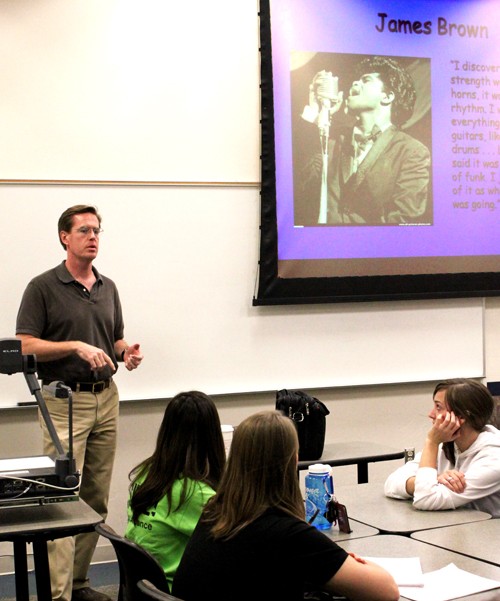You already rock, so why not pop into Rock and American Popular Music? It satisfies Tier Two general education requirements for Arts; Gender, Race, Class, Ethnicity; and Non-Western Area Studies.
The class is a survey of the history of popular music from the 1950s to the present and an examination of the issues in the music industry.
“”We also look at business, technology, gender, ethnicity and how those affect music,”” class instructor Brian Moon said.
The class is not lecture-based. Instead, students listen to music and watch videos that correlate with the class outline.
“”I sometimes show bits and pieces of documentaries,”” Moon said. “”Also, we watch music videos and discuss how images relate to the song and the meaning of it.””
Each student is required to prepare and write a song by the end of the semester, as well as complete other projects, but prior knowledge of songwriting is not required.
“”My current class is about to do a project to create a fictitious music festival,”” Moon said. This is one of the ways of getting students to reflect on a time period and its effect on music, he said.
“”They are going to be required to have festival bands of different times that all relate to one theme,”” Moon added.
Students are put in groups, usually with at least one musician, and are matched by common interest.
Students who take the morning lectures for this class are generally athletes because they have priority in registration.
“”Honestly, the more priority you have in enrollment, the better your chance is of getting into the class,”” Moon said.
Because of high demand, the class has added seats every semester since its inception. It began with around 120 seats, and currently it offers places for 200 to 300 students.
“”They presume it will be easy and interesting,”” Moon said. “”And they’re probably right. People are interested in this music, and I teach you about music that you presumably listen to.””
When there is a major event — such as Ashlee Simpson lip-syncing, the movie “”Walk the Line”” or Michael Jackson’s death — there are discussions held, giving students the opportunity to voice their opinions and analyze how events like these affect music.
“”People say ‘Ashley Simpson makes music that’s fake,'”” Moon said. “”But it’s much more complicated than that. By understanding marketing, music and all the processes of recording they’ll be aware of much more.””
Moon, like the music he studies, moves with the times.
“”I try to stay current so I’m not entirely clueless,”” Moon said. “”I follow most all types of popular music — from rap to country to rock to indie to punk and more.””
Since music is personal, so are the assignments, Moon added.
“”I try to make assignments that allow students to find what they’re interested in and present it,”” he said. “”I let them fill in the story when I might have skipped over their favorite band ever.””
“”This class is interesting and the assignments are a lot of fun,”” said Abe Zverow, an undecided sophomore. “”There are really interesting articles we analyze and it’s fun for everybody.””









